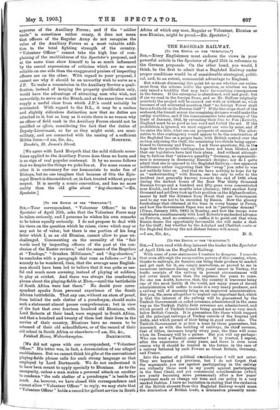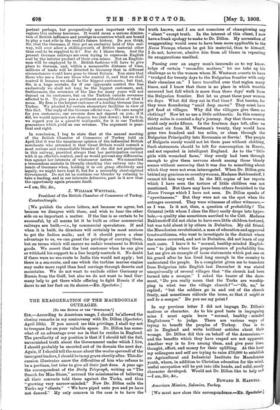[TO THE EDITOR OP THE "SPECTATOR.")
Sma,—I have read with deep interest the leader in the Spectator of April 11th on the Baghdad Railway.
With some of your statements I venture to disagree. I concede that even although the recuperative powers of this country, when, thanks to railways, its farmers can bring their produce to market and get cash for it, are simply marvellous, as proved to me in numerous instances during my fifty years' career in Turkey, the traffic receipts of the railway in present circumstances will not cover much more thah the expenses for years to come. No one can doubt, however, that, the country it traverses being one of the most fertile ia the world, not many years of decent, administration will suffice to make it a very heavy producer, and a railway will of necessity bring on an improved administration. But you, Sir, seem altogether to neglect one important fact, which is that the interest of the railway will be guaranteed by the Turkish Government on ceded revenues, administered in the same way as the Turkish Public Debt revenues are administered, and which permit of Turkish Consols being quoted not so very much below British Consols. It is guarantees like these which support all the principal railways of Turkey outside of the Smyrna and Aidin, and which permit of their being in good credit also. The Turkish Government is at first a loser by these guarantees, but inasmuch as with the building of railways, its chief revenue, that of tithes, increases largely every year, the time will come when its Treasury will be a gainer. But you will say perhaps : Who can trust a Turkish guarantee ? It is trusted, I repeat, after the experience of many years, and there is even more reason why it should be trusted in the future in the case of a railway fathered by such Powers as Great Britain, Germany, and France.
Into the matter of political considerations I will not enter. They are beyond my province, but I do not forget that the arguments you use against participating in the railway are virtually those used in my youth against participating in the Suez Canal, and yet commercial considerations (which are yearly becoming more paramount) after a few years' experience made us change our tone and our policy in a very marked fashion. I have no hesitation in stating that the exclusion of the British element from this Baghdad Railway would mean the diminution of British trade, a diminution presently unim- portant perhaps, but prospectively most important with the regions this railway traverses. It would mean a serious diminu- tion of British influence and prestige in countries which are bound to play a vast role in the world's future history. Do you think, Sir, that the Germans, if they get an exclusive hold of this rail- way, will ever allow a shillingsworth of British material other than coal to be supplied to it ? Nor do I blame them. And the present German railways are even trying to supersede English coal by the inferior product of their own mines. Not an English. man will be employed by it. British fashions will have to give place to German, and, within a measurable distance of time, millions of trade will be diverted to Germany that in different circumstances would have gone to Great Britain. You state that those who use a line are those who control it, and that we shall control it because we shall be the biggest customers ; but that, Sir, is a huge mistake, for if our opponents control the line exclusively we shall not long be the biggest customers, and, furthermore, the revenues of the line for many years will not depend on its customers, but on the Turkish outside revenues affected to it. To give you a pertinent exemplification of what I mean. My firm is the largest customer of a leading German line in Turkey. We pleaded for certain elementary facilities in view of this fact. The reply of the German official was,—We care naught for you customers ; our revenue does not depend on you ; if it did, we would approach you chapeau bas (hat down) ; but as it is, we regard you as a quantite n4gligeable, for it is our Turkish guarantees which yield us our revenue. The argument is prac- tical and right.
In conclusion, I beg to state that at the annual meeting of the British Chamber of Commerce of Turkey held on April 21st it was the unanimous opinion of the influential British merchants who attended it that Great Britain would commit a most serious and irremediable blunder if she did not participate in this railway, provided always that her participation carried with it an effective control, such as would prevent any differentia- tion against her interests of whatsoever nature. We committed a tremendous mistake in literally chucking this railway into the hands of Germans when, holding it in our grasp effectively and legally, we might have kept it, but for a miserably short-sighted Government. Do not let us continue our blunder by refusing to take a leading, and in our interests defensive, part in it now that the opportunity again presents itself.
—I am, Sir, &e.,
J. WILLIAM WRITTALL, President of the British Chamber of Commerce of Turkey. Constantinople.
[We publish the above letters, not because we agree, but because we disagree with them, and wish to hear the other side on so important a matter. If the line is so certain to be successful, by all means let it be built as other commercial
railways are by commercial speculators. If and when it is built, its directors will certainly be most anxious to get the Indian mails; and if it should prove a clear advantage to us, we can grant the privilege of carrying them, but on terms which will ensure no unfair treatment to British goods. We assert that the best customer when he can give or withhold his support to a line largely controls it. No doubt if there were no sea-route to India this would not apply ; but there is a sea-route, and one which the turbine marine engine may make more rapid than land carriage through deserts and mountains. We do not want to exclude either Germany or Russia from the Gulf, but also we do not want to lend Ger- many help to get there while offering to fight Russia if she
dares to set her foot on its shores.—En. Spectator.]











































 Previous page
Previous page